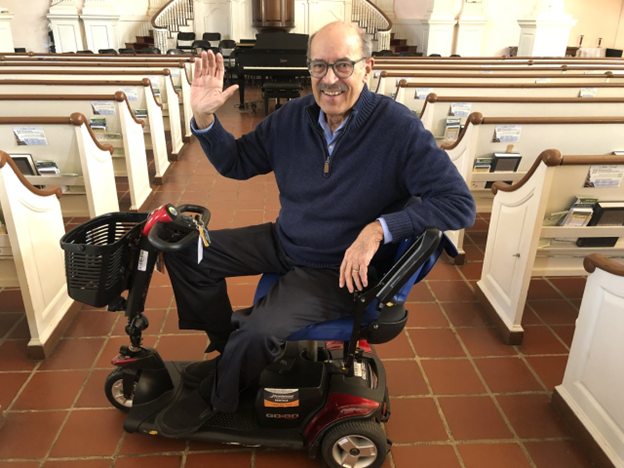
scooter in the Sanctuary.
Some of you will have noticed me using a scooter around the church in recent weeks. A few folks have asked me about it: “That’s new.” “Are you OK?”
You have all seen me walking with a cane, slow and often unsteady. The medical diagnosis of my condition is a neuropathy, the result of an injury more than 15 years ago. I am in no pain but I have only limited control of my feet. I’ve delayed the progress of the disease with exercise for years. But walking any distance had just become hard enough, it was time for me to have more help.
I’ve used scooters at UUA General Assemblies for years. The distances and tight time schedules at large Convention Centers really required it.
But how would the reaction be in congregational ministry? How would All Souls react? Would you all start to think that I was slipping, a bit less able to minister in this demanding transitional roll? Is your image of ministerial leadership bound up with a particular level of physical ability?
Would my pride have to take a hit?
Thus far, the only thing expressed directly to me has been approval.
What you need to know is that having the scooter is liberating for me. I no longer dread longer walks. I’m able to greet people and shake hands or offer hugs without worrying about my stability.
And now, instead of thinking of myself as slow and unsteady…I can FLY. I can zoom around faster than most of you can walk. So liberating.
When I discussed making this change with a coach I meet with regularly, her immediate response was how good it would be for the congregation to deal with issues of disability. She saw my use of a scooter as an act of ministry.
Several members have commented to me that it is a blessing that All Souls invested the money to make the facility accessible. I affirm that, to be sure, but I also ask them if they’ve looked at our pulpit recently.
Beyond the details of accessibility and the questions of marginalization the scooter may raise, and beyond the work I still have to do on my pride, there is a more general and more theological thought I want to offer.
We all deal with the bodies we have been given. Age and stage, as well as wear and tear change them over time. Our faith tells us that we are all lovable and already loved…regardless of the body that holds and is united with our spirit.
There are no instructions delivered to us with these bodies, nor instructions about how to deal with them as they change over time. We have to find other resources to help us accept the power and the limits of our living. We need the spirit in that process, of course, but also a community to remind us that we are both lovable and lucky.
I have long loved this piece by Marcia Lewton:
Instructions
Where you live now, you will rouse from each night’s darkness when the delivery arrives. Then, as the eastern sky pinks up like a newborn, the birds will fill the air with song. In a world of sound and light and precious breath, you will open the package. Your task is to use its contents.
No day’s box is like another, nor is any person’s. Usually, but not always, you will find everything you need. Often there will be more than you need, and discovering ways to use it will be a trial and a delight.
Comparing your box with another’s will give you both pleasure and pain. Desire is a condition of your life, and you will often want what you do not have. Sometimes you can trade. You will be tempted to steal. You will protect yourself from theft.
You will try to save one day’s leftovers for another day. Sometimes you will succeed. Other times you will see what you did not use swept into a great heap of waste, gone forever, and you will feel regret at the loss.
Your fellow—and you, yourself—will judge what you do with the contents of your box. These judgments will sometimes bring satisfaction, sometimes dismay, and you will wrestle with them continually.
You ask me what to do. I remain silent. In darkness I fill the boxes and in light you open them.
Blessings,
Rev. Bill
